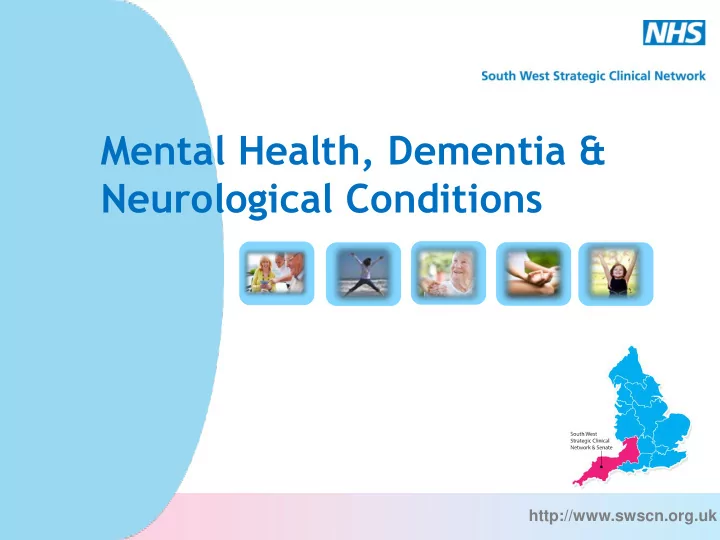

Mental Health, Dementia & Neurological Conditions http://www.swscn.org.uk
Mental Health, Dementia & Neurological Conditions South West Region IAPT Workforce http://www.swscn.org.uk
The South West Region Population and Demographics Mental Health, Dementia & Neurological Conditions • Large area, beautiful countryside, coast and vibrant cities • Pockets of high rural and urban deprivation • Population over 5 million • Higher than average pop. of 65s • Increasing population http://www.swscn.org.uk
Regional IAPT Provision Mental Health, Dementia & Neurological Conditions 27 Providers in 12 CCG areas 8- IAPT Plus 4 - IAPT NHS, Social Enterprises AQP contract 14 AQP contract 2 and NHS Trusts, C I C providers providers Partnerships Charities http://www.swscn.org.uk
Identifying the Workforce Mental Health, Dementia & Neurological Conditions • Mapping exercise: – Who makes up the IAPT workforce currently? – Is this the right workforce for the future? – If not what do we need to do? • Pressures on the workforce to meet targets and the needs of people accessing the service. http://www.swscn.org.uk
The IAPT Workforce Mental Health, Dementia & Neurological Conditions Region IAPT Workforce: 778.21 WTE Volunteer coordinator 1 Receptionists 2 Data Analyst/Business Manager 8.85 Administrators 60.60 PWP Trainees 39 HIT Trainees 14 Assistant Psychology practitioners 51.2 Clinical Psychologists 11.4 Team Managers/Leaders 12 Service Leads 12.05 Clinical leads 12.65 Professional lead role for lead for PWP 0.3 Employment support workers 4.5 Non IAPT trained Counsellors and Psychological therapists 98.42 IAPT trained Counsellors and therapists 19.4 Nursing staff 27.4 Senior PWPs 27 Non IAPT Trained Wellness advisors 22 Psychological Wellbeing Practitioner (PWP) 179.44 High Intensity Therapists 178.4 http://www.swscn.org.uk
Ratio of IAPT and Non IAPT Trained Practitioners Mental Health, Dementia & Neurological Conditions 33% IAPT trained Non IAPT trained 67% http://www.swscn.org.uk
Ratio of Hi to LI capacity Mental Health, Dementia & Neurological Conditions Including non IAPT trained Excluding non IAPT trained practitioners practitioners 46% 47% HI Capacity HI Capacity LI Capacity LI Capacity 53% 54% http://www.swscn.org.uk
Availability to the four non Mental Health, Dementia & CBT Modalities by CCG Neurological Conditions CCG area CfD CTfD DIT IPT EMDR BaNES: Y Y Y Bristol Y Y Y Y Y Cornwall Y Y Y Y Gloucestershire Y Y Y Y Y New Devon (Plymouth) Y Y Y New Devon Y North Somerset Y Y Y Somerset Y Y Y South Gloucester Y South Devon and Torbay Y Y Swindon Y Y Y Y Wiltshire Y Y Y Y Total 12 7 4 8 6 http://www.swscn.org.uk
Current Workforce Issues Mental Health, Dementia & Neurological Conditions • Lack of workforce capacity and capability • Recruitment to HIT/ Counselling posts • Recruitment and retention of PWPs • Ongoing issues with IAPT Training http://www.swscn.org.uk
Sufficiency of the workforce Mental Health, Dementia & Neurological Conditions IAPT Workforce requirements based upon 40 therapists per 250,000 head of population Regional HIT PWP Non IAPT Totals Population Therapy 4,796,362 Workforce Regional 460 307 767 Requirements Current 190 202 177 569 workforce Difference 270 105 198 http://www.swscn.org.uk
Regional responses to the meet current challenges Mental Health, Dementia & Neurological Conditions • Negotiating with commissioners • Changing recruitment patterns • Prioritising supervision • Reviewing workloads/activity levels to increase variety • Providing in house training/CPD http://www.swscn.org.uk
Mental Health, Dementia & Neurological Conditions Year Commissions Starters Still on Completers Attrition Programme University of Exeter 2011/12 45 14 0 13 7% High Intensity (HI) 2012/13 22 21 1 18 10% 2013/14 29 27 13 13 4% 2014/15 16 10 10 0 0% Psychological Wellbeing 2011/12 75 66 0 58 12% Practitioner (PWP) 2012/13 60 49 0 45 8% 2013/14 75 71 1 67 4% 2014/15 54 43 42 0 2% 2013/14 33 Supervision Module 2014/15 46 32 http://www.swscn.org.uk
PWP and HIT Training: A mixed picture Mental Health, Dementia & Neurological Conditions Quality and relevance of the Curriculum Number of available places Entry Requirements Accessing and filling training places http://www.swscn.org.uk
The National Picture Mental Health, Dementia & Neurological Conditions • Access, recovery and waiting times- 75% 6/52, 95% 18/52 • Outcome measures unlikely to change, and explicit expectation that 50%+ will be achieved • Proportion of non IAPT trained workers in the SW therefore a big issue • An appropriate pathway for those with SMI • Investment of £58-£64 per head http://www.swscn.org.uk
Moving forward to the future Mental Health, Dementia & Neurological Conditions • Sufficient and fully funded IAPT service to meet national targets and planned activity • Agree clear manageable care pathway for people with severe and enduring needs • Support providers to access and take available IAPT training places • Develop good career structures for PWPs • Agree a regional clinical contact rate http://www.swscn.org.uk
Training considerations Mental Health, Dementia & Neurological Conditions • Increase number of IAPT trained practitioners • Salary costs funded for IAPT training places • Flexible access to IAPT training places • Additional training places in CfD, CTfD and other non CBT modalities • Additional skills training for PWPs and HITs http://www.swscn.org.uk
Mental Health, Dementia & Neurological Conditions Questions and Thoughts? http://www.swscn.org.uk
Recommend
More recommend